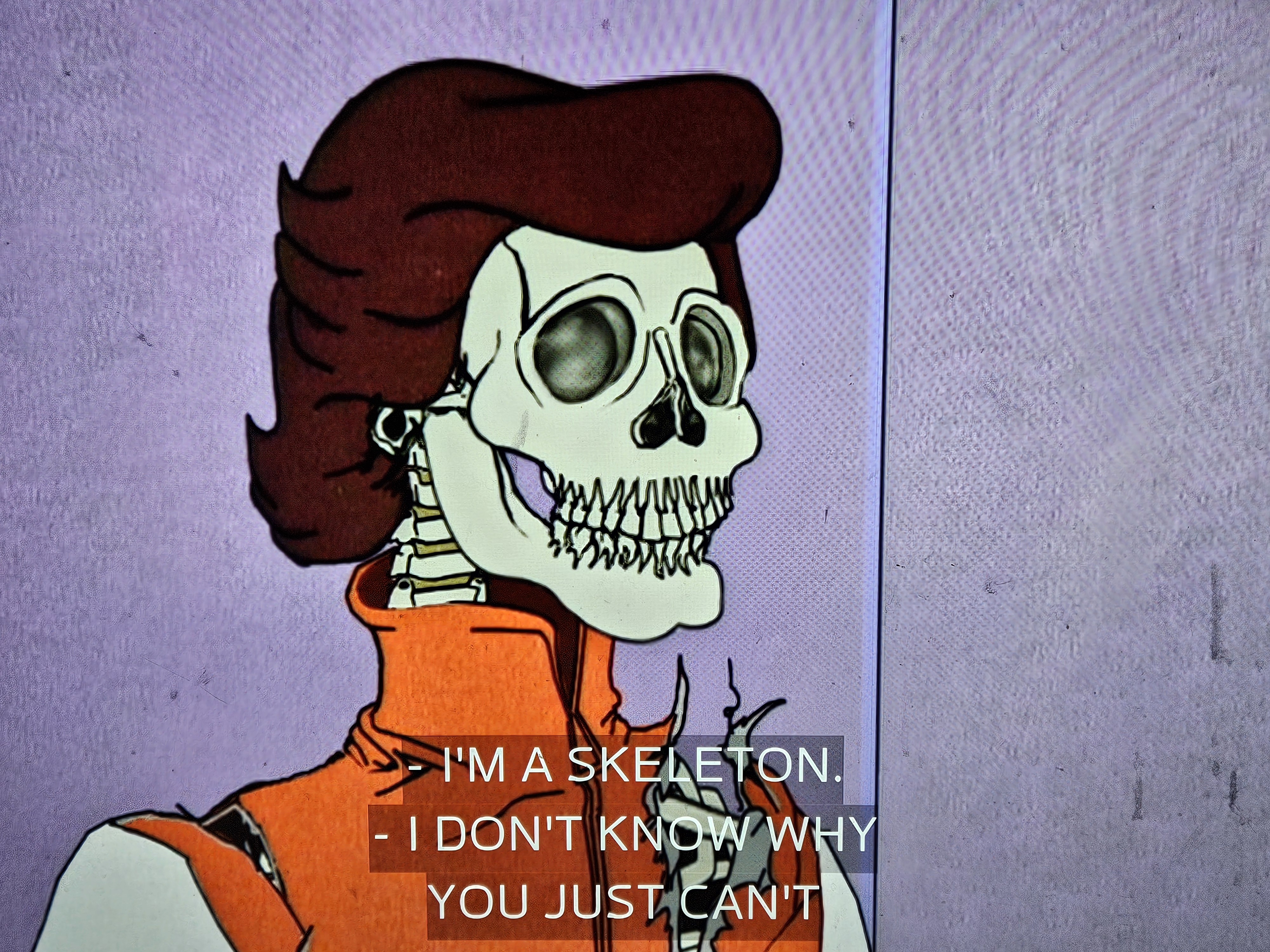is there such a thing? do animals, plants, or other things have them?
Don't think so. Humans, like all animals, are electrified meat. Consciousness is an emergent illusion, and the only boundary between you and me is the quirk of evolution that birthed bodies capable of communicating only through metaphors and symbols.
Only octopus have them. Neanderthals had them to, but we killed them all.
Octopi are the True Inheritors of this Earth and you can't convince me otherwise. We are usurpers; seizing the divine birthright of our cephalopod kin with our grubby ape mits.
We are here merely to provide the plastic molecule necessary for the next stage of octopus evolution. Their bones shall bend and never break, praise be the True Inheritors!
There's a bit in Debt (the book I'm contractually obligated to mention in every one of my posts apparently because it's occupying my entire brain rent free) where Graeber describes missionaries trying to introduce the idea of the immortal soul to relatively undisturbed tribal peoples, and what really freaked them out was the idea that there was a body separate from the soul, not that there was a soul. I think that dually, there isn't much point to worrying about the potential immortality of the soul, though it does seem a useful basis for getting people to care long term about the earth and the consequences of their actions, but it is probably a useful way to encapsulate that people's experiences are complex and intricate and there isn't much point in trying to parse them into categorical separates in the manner of Cartesian dualism.
Yes, and if you kill someone more powerful than you, you take their soul and their power
The one true aim of Chapo has to be becoming strong enough to murder God
I figure if God is real and omnipotent as described and I'm a disbeliever it works out the same either way, I'm damned. But if God is real but NOT impotent as described it stands to reason the true aim of sentient consciousness is to become so powerful as to murder God.
this is ur brain on jrpgs
If you don't get the lightning and dramatic sting you're doing something wrong
Call me Kain because I'm reaving the souls of my fallen enemies
They need to make a new one
That multiplayer game doesn't count
I don't think so; at least not in a permanent, static sense of "true self." Anyone who's taken enough DMT or acid knows that the only thing separating your sense of self from everything else is a few molecules of the right chemical cocktail. And so if you reject the idea of a supernatural aspect of "you" existing independent of your body, all you're left with is consciousness being some emergent phenomenon of biology and physics. At best it's a pattern, and one that shifts radically from year to year, moment to moment.
I think there is something analogous to souls that exists, but there aren't immutable and/or eternal souls like you see depicted in media. There's no ghost pulling levers in your brain or whatever.
But I do think consciousness itself can be thought of as analogous. It's the core of "you" and of "I," and it quite possibly could continue on in some form after death.
To use the Spinozan (and Deleuzian) school of thought, wherein all things are constructed from the same matter and therefore only different in their present form rather than their essence, there is no individual soul just the over soul that we all embody a portion of. Matt talks about this sort of shit on the cushvlogs all the time, but the gist is that we are all parts of the same larger social entity and that that entity might be what we recognize as a divine being. I find this compelling as a socialist because it’s the underlying principle behind Durkheim’s analysis of the elemental forms of religion. As Durkheim describes religion, in its most basic form, is created from a group of individuals experiencing a power larger than themselves through ritualistic social interaction wherein the social whole becomes greater than the sum of the individual parts. Essentially through social connection we nihiliate the ego and feel our connection to everything around us, touching the divine social entity. That’s where socialism works for me, in tapping into the social fabric that binds people together past their own individual boundaries. It’s why Matt keeps going on about socialism needing a spirituality on his streams.
So from my perspective you don’t have a soul because that’s a liberalism where you assume your own godhood. Instead you encompass a piece of the oversoul that we are all a part of
I'm not personally familiar with Vedanta or emanationism myself so I can't properly answer your question. Based on your description though I don't think they're necessarily the same idea. Spinoza imagines a single fundamental matter that all things are constructed from in their own time and place. He does not posit a single fundamental truth that our realities more or less pertain to. A chair with a wobbly leg isn't less of a chair in non-essentialist thought whereas essentialist thought would say it is further away from the singular 'truth' of what a chair is because it embodies the essence of what a chair is to a lesser extent. (This shit is why essentialist thought can never be liberationary imo, it implicitly posits a hierarchy as a transcendental truth)
If the soul, or more scientifically, what we call a consciousness is in a state that exists, either at the quantum level or otherwise, then could that be harnessed at some point? Where does that potential energy go? Could future humanity find a way to tap it back into a living brain? Moreover, does future humanity have a duty to bring back the consciousnesses of the deceased? What will the ethics of that entail?
spoiler
Imagining a future where you die in the present day and get revived millenia into the future against your will to take part in some deranged experiment. Maybe civilizations collapse again and again and more deranged ideologies come about enslaving the past dead. Imagine being forced to live under capitalism forever, and not even death can be a final release.
sounds like a lovely idea, in the absence of hell--we make our own
i know what you're describing is awful but all i can say is 'cool', cause tbh that'd be fascinating even if wielded by like mega-evil bezos dynasty godkings.
Imagine being forced to live under capitalism forever, and not even death can be a final release.
If this is a serious possibility the most rational thing you can do is trying to assess what the job market is going to look like in the far future and dedicating your whole life to becoming the most useless person for the future capitalism possible.
I have to finish reading the Art of not Being Governed.
Check out the idea of quantum archaeology . It describes a lot of what you're talking about (forgive the post's mention of absolute ghoul Ray Kurzweil; it's kind of unavoidable when talking about anything related to transhumanism).
I skimmed the article, but the basic idea is trying to simulate a person's life until you get a simulation consistent with everything we already know about the person, right?
It's strange no one brings up the ethical concerns about the process (not the result). Like simulating Holocaust with nanometer accuracy including the brains of it's every victim million times until you get a version of Anne Frank that writes the same diary word for word has, you know, implications.
implications
No more so than are already inherent to our own existence, I would think. If you're simulating a reality with the goal of eventually (and accurately) recreating a person's consciousness at their point of death, then from the simulated consciousness' perspective it'll always be their first time experiencing everything. An accurately-recreated Anne Frank would be one who experienced her life once, not millions of times over. Hell, for all we know we could be simulated recreations of long-dead people, and at the moment of death whoever is running the program could just copy-paste us up from the past simulation into the Matrioshka Brain or whatever.
An accurately-recreated Anne Frank would be one who experienced her life once, not millions of times over.
Yeah, but by the nature of the process you are also going to get a million of not-accurately-recreated Annes who each experience their life once (or at least until they decide they want to write Faust fanfiction instead of a diary as they are supposed to).
Yeah, but by the nature of the process you are also going to get a million of not-accurately-recreated Annes who each experience their life once (or at least until they decide they want to write Faust fanfiction instead of a diary as they are supposed to).
True, but in this scenario you'd assume that as soon as the people (beings?) running the program detected some kind of discrepancy between a simulation instance and information in historical record, they'd terminate that instance. If we keep to the anthropic principle, this means only the 100% accurate Anne would have any memory of having ever existed in the first place.
Not to mention that for this type of thing to be any more than speculative science fantasy, you'd need computational and predictive power far beyond anything available today. I'd like to think that the process wouldn't involve as much trial-and-error guesswork as we might think from our own technological context.
they’d terminate that instance.
What I'm trying to say is that even if you've terminated the instance after it used a different synonym in the diary and the memories of them being simulated are deleted, you have still subjected another copy to Holocaust.
you’d need computational and predictive power far beyond anything available today
It's seems like part of the suggestion is that we simulate everything until we get it right, but the other possibility the author is hoping for is that some fundamental advancement in understanding of physics will let us straight up look into the past and copy people's brain states.
Funny titbit. In one of the Culture novels, Excession, I think. The Minds (superpowerful AIs that run everything) could simulate entire planets worth of people on molecular scale and get incredibly accurate predictions out of it, but (generally) don't, because that would be functionally the same thing as doing to the people the things you're simulating.
What I’m trying to say is that even if you’ve terminated the instance after it used a different synonym in the diary and the memories of them being simulated are deleted, you have still subjected another copy to Holocaust.
That's a fair point. Though I think in trying to reconcile that concern with the possibility - maybe moral duty? - of resurrecting everyone who's ever lived and died, you'd run up against the existential questions of what defines experience, memory and the "self." Can it be said that a being has been subjected to any kind of suffering, if immediately afterwards all memory and physical evidence of that suffering is completely erased? If you were to somehow have all your memories of your life up to this point erased tonight when you when you went to bed, would the "you" that woke up tomorrow without any of your current memories still regret any suffering the "you" reading this now has experienced?
Honestly your point may be a good argument for not even bothering with quantum archaeology at all, because only beings that exist have the capacity to remember their past sufferings. Except that if conscious existence is inevitable (non-existing things can't experience non-existence, I don't think), than so is suffering, so at some point I think it might just become a kind of arbitrary moral algebra. What's worse? Subjecting millions of consciousnesses to suffering, or not allowing millions of consciousnesses a second chance at a better existence when their original lives were probably spent mostly in suffering?
People keep telling me to read The Culture series but I've just never gotten around to it, lol.
Huh. My intuition is that inflicting suffering on a conscious being at bad no matter whether they remember it or not, whether there is someone to regret it or not. Like in the end we're all going to die and our memories are going to get lost. Making us suffer was still wrong in retrospect.
There is this dude whom the Nolan movie Memento was based on. He can't form long term memories anymore and forgets anything new after like ten minutes. If I were to kidnap and torture him a bit and return him home it would be like if nothing happened in half an hour. Still seem like an incredibly shitty thing to do.
If analyse the whole thing from the perspective of simple negative utilitarianism (where the only rule is to minimise suffering) you get a sort of antinatalism. There's no point of ressurecting people because dead people can't suffer while ressurected might, even without considering additional suffering during simulation.
If go with usual utilitarianism (maximise pleasure minus suffering) you might be compelled to ressurect people considering you new world will give them more net pleasure than the suffering they experience in simulation. On the other hand in the framework like this it would make more sense just to make (or clone) more people conventional way because those people would not have to deal with painful simulation to get born.
A recently popular form is preference utilitarianism. The idea is maximising not pleasure specifically but getting people what they think they want. Like if I decided I wanted to be hit in the balls the ethical action is to hit me in the balls even if you're sure it will only cause me suffering. In this context you'd have to ask the future ressurecty whether they want to deal with all the shit in the simulation to be reborn in the cool utopian future. Obviously if the person didn't leave a specific will you'd have to run them through the simulation to ask them this question which in itself would be a contradiction.
absolute ghoul Ray Kurzweil
How much of a ghoul is he? I always stumble on bits of his writing when I read about transhumanism but I don't know anything about his politics or whatever.
He's a multi-millionaire libertarian finance capitalist type, like a lot of the big names in the silicon valley transhumanist movement. He's also the guy responsible, maybe more than anyone else, for shaping the culture of that movement. His goal is not to better the human condition for everyone, but for himself specifically. He's said before that he basically thinks, if the poors get bionic eyeballs and the reverse-aging pills sometime down the line, great, but it's not a priority.
“Soul” is what I think of as my discrete experience of existence. Rather than me “having” a soul, universal soul/consciousness is experiencing itself in/through me :)




